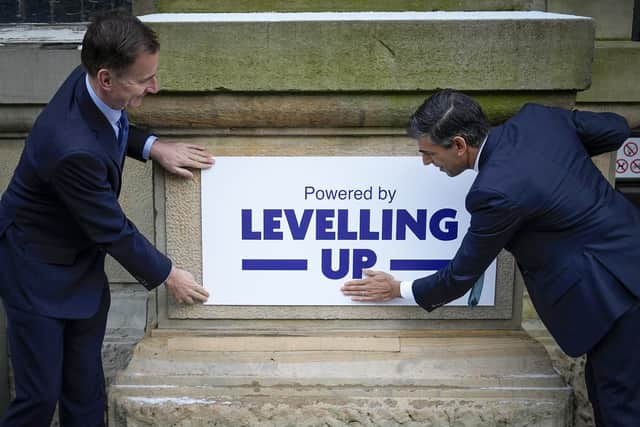Why Brexit pessimism and rash recession forecasts have terminally damaged the Conservative Government - Brian Monteith
Setting and controlling the economic narrative that defines what policy decisions are taken is what resulted in Rishi Sunak becoming prime minister. It was Sunak who argued there was a need for a rise in National Insurance that put Conservatives into an unnecessary tailspin. Ever since then the internal party debate for higher or lower taxes has been fought with what seemed like victories for Liz Truss turning into retreats and then defeat.
It was her call for rebooting the economy by reversing the Sunak NIC rise and using taxes to achieve growth that won her the support of party members. Her quick departure was caused not just because she lacked the backing of her parliamentary colleagues, it was the narrative that informed them economic catastrophe was approaching unless they ditched her prospectus and raised taxes.
Advertisement
Hide AdAdvertisement
Hide AdThe narrative was being stoked the calamities confronting the nation were due to a Brexit that was not delivering and tax cuts that were “unfunded”.


With the Bank of England already failing in its job of preventing soaring inflation it was then posted missing in monitoring the risks pension funds were taking that placed great strain on the Government bond market. The International Monetary Fund (IMF) also stepped in to attack the Truss Government for making tax cuts, while the German finance minister had the impudence to do the same. We then had forecasts of black holes in the public finances that meant tax cuts would need to become tax rises.
First Truss abandoned the tax cut of the top rate and then changed chancellor by recruiting Jeremy Hunt. It was not enough to save her. Hunt duly obliged with higher taxes and the switch from Truss to Sunak confirmed the inevitable logic that Sunak’s economic narrative had demanded.
Fast forward four months and with Hunt’s first full budget now approaching on March 15, the economic narrative is again being fought over. What we now find is that much, if not all, that was said last autumn has proven to be wildly inaccurate, raising questions about the motives behind the economic modelling and deluge of pessimism that just happened to coincide.
In its latest forecast, and with no self-awareness, the IMF has now warned of the prospects for UK economic growth and called for tax cuts. The Office for Budget Responsibility has just accepted its predictions for the deficit were pessimistic to the tune of £30 billion, suggesting the reversal of the Truss tax cuts was unnecessary or at least premature.
Last week the Office of National Statistics (ONS) revealed rather than Brexit leading to a collapse in exports, the latest figures confirm what the initial quarterly results for 2022 had been telling us – that exports were rising. The ONS was able to show with a telling bar chart that exports had risen every year since the 2016 EU referendum until the Covid years of 2020 and 2021 – but since the lifting of restrictions British exports in 2022 were higher than the last pre-Covid year of 2019.
Also last week a 64-page in-depth study of UK trade by London-based Australian economist Catherine McBride found the real problems faced by British commerce were due to lockdowns depressing demand for our goods and creating particular problems for our most important industries. The grounding of airlines resulted in orders for aircraft engines being cancelled or delayed; the shortages of computer chips from the far east and scarcities caused by broken supply chains especially damaged British car exports.
By digging deep into the ONS figures to produce a sector-by-sector analysis, McBride has established that with the exception of vehicles, exports to EU destinations generally fell in line with – or were less than – export decreases to non-EU countries. In some sectors, UK exports actually increased to EU countries while decreasing to non-EU countries – and in some sectors exports to the EU increased for some countries some while decreasing for others. Such variations between individual EU countries and between EU and non-EU countries disproves Brexit as a main cause in the poor UK trade performance for 2020/21.
Advertisement
Hide AdAdvertisement
Hide AdYet as the improving ONS trade figures of every quarter of 2022 were published, the BBC, OBR and Financial Times persisted on reporting a collapse in trade based on the out-of-date 2021 data. Why? Were they more interested in building a pessimistic narrative than discussing the facts?
The OBR was also arguing the UK would move into a recession in the last quarter of 2022 and Hunt used this in his emergency budget to justify his tax increases. We now know, thanks to the ONS figures again, there was no recession – giving more force to the argument the narrative of the doomsayers has been wrong all along.
No wonder there is mounting concern across British industry the proposed 30 per cent increase in UK Corporation Tax from 19 per cent to 25 per cent that is due to kick-in from April will throw the economy into real rather than imagined problems.
The explanation of the pessimism that surrounds the UK’s economic narrative is clear to me. It was caused by the dereliction of its duty by the Bank of England, the failed economic modelling of the OBR and Treasury – and a Government that has no faith in its own supposed policy of exploiting the comparative advantages that Brexit could give British businesses.
Tax cuts have not been done, Brexit has not been done and those realities that expose a false narrative are what will cost the Conservatives the next election.
- Brian Monteith is a former member of the Scottish and European Parliaments and Editor of ThinkScotland.org
Comments
Want to join the conversation? Please or to comment on this article.